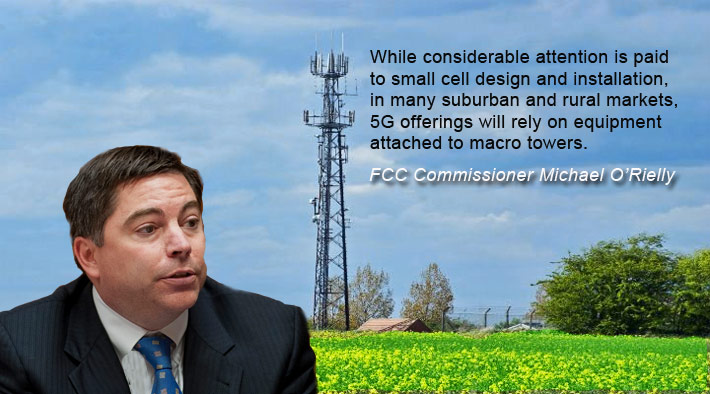
Although small cells and 5G were high on the list of topics during yesterday’s U.S. Senate Committee on Commerce, Science, & Transportation’s hearing on Industries of the Future, FCC Commissioner Michael O’Rielly emphasized that 5G deployment requires more than just sound spectrum policy to be successful, and macro towers and additional worker skill sets are needed

FCC Commissioner Jessica Rosenworcel said during the hearing that there is a need to “have to train another 20,000 tower techs.” Wireless Estimator in past inquiries to the FCC can not obtain an answer as to how the often-quoted shortage was identified.
“It will need a concerted effort to bypass attempts by rogue local and state governments to extract untenable riches from new technology users or drag out siting reviews due to ineptitude or attempts to preserve power. This is not a new phenomenon, and it is why legislation on the topic, like the Thune-Schatz bill, would be so helpful,” O’Rielly informed committee members.
“While considerable attention is paid to small cell design and installation, in many suburban and rural markets, 5G offerings will rely on equipment attached to macro towers. The Commission will need to be aggressive to ensure the siting process is not impeded, and I am hopeful we will take new action on macros in the very near future,” he said.
O’Rielly also cited the need for the country to groom more workers with additional skill sets to provide 5G services.
“While much attention has rightfully been paid to the need for more tower installation crews, job growth in additional fields, including radio frequency management, communications engineering, and other related skills, is similarly needed. While some of these positions can be filled in the regular course and with on-the-job training, others will require more extensive efforts. In other words, industry is likely to require a more systemic plan of action, potentially leveraging the assistance of the Federal government, than in past technological evolutions.”
He said the Department of Labor, given its vast resources, might be better equipped to exert some leadership in that area, and he understood, “it has announced new grant monies for apprenticeship programs that include telecommunications and broadband services.”
FCC Commissioner Jessica Rosenworcel also testified about the need a plan to invest in training for the jobs of the future.
“Across the board, we need to do more to prepare our workforce for digital change. We can start with developing the workforce we need to build 5G networks. In the near term, the United States will have to train another 20,000 tower climbers to help install 5G equipment,” she said.
In the longer term, she agreed with O’Rielly that workers will need additional skill sets to roll out 5G, and she also saw the Department of Labor as an important agency to foster registered apprenticeship programs.
“The skills necessary to secure and keep a job are changing fast, but data suggests a steady decline in the amount employers are investing in their workforce. To remedy this, we need to encourage more investment in our workers. It’s time to explore a human capital tax credit to offset a portion of new training activities to support the future of work. This could help upgrade our workforce, ensure access to in-demand skills, and create more job security for American workers nationwide,” Rosenworcel said.
The Industries of the Future Act of 2020 bill was introduced at the hearing.
In a statement of support, WIA Vice President, Government and Public Affairs Matt Mandel said, “WIA strongly supports the Industries of the Future Act. Better federal coordination on workforce development investments is vital to make the future workforce is a properly trained workforce. WIA has been leading the way to train and build a 5G-ready workforce, and this legislation is a significant leap for future skills and future jobs that our nation needs. I would like to thank Chairman Wicker and Sens. Gardner, Baldwin, and Peters for their vision and commitment to ensuring that the U.S. will continue to lead the world in wireless innovation.”
















